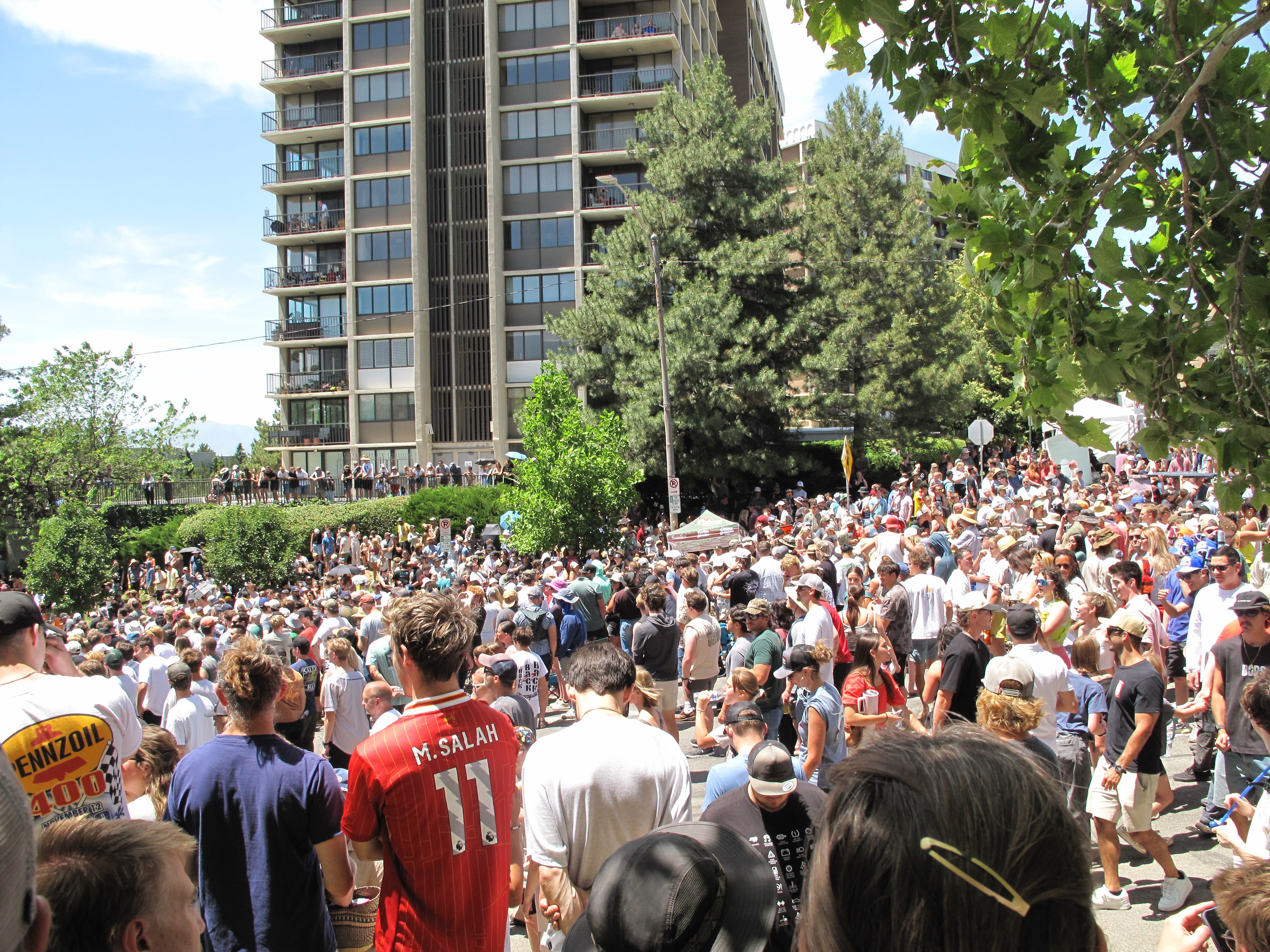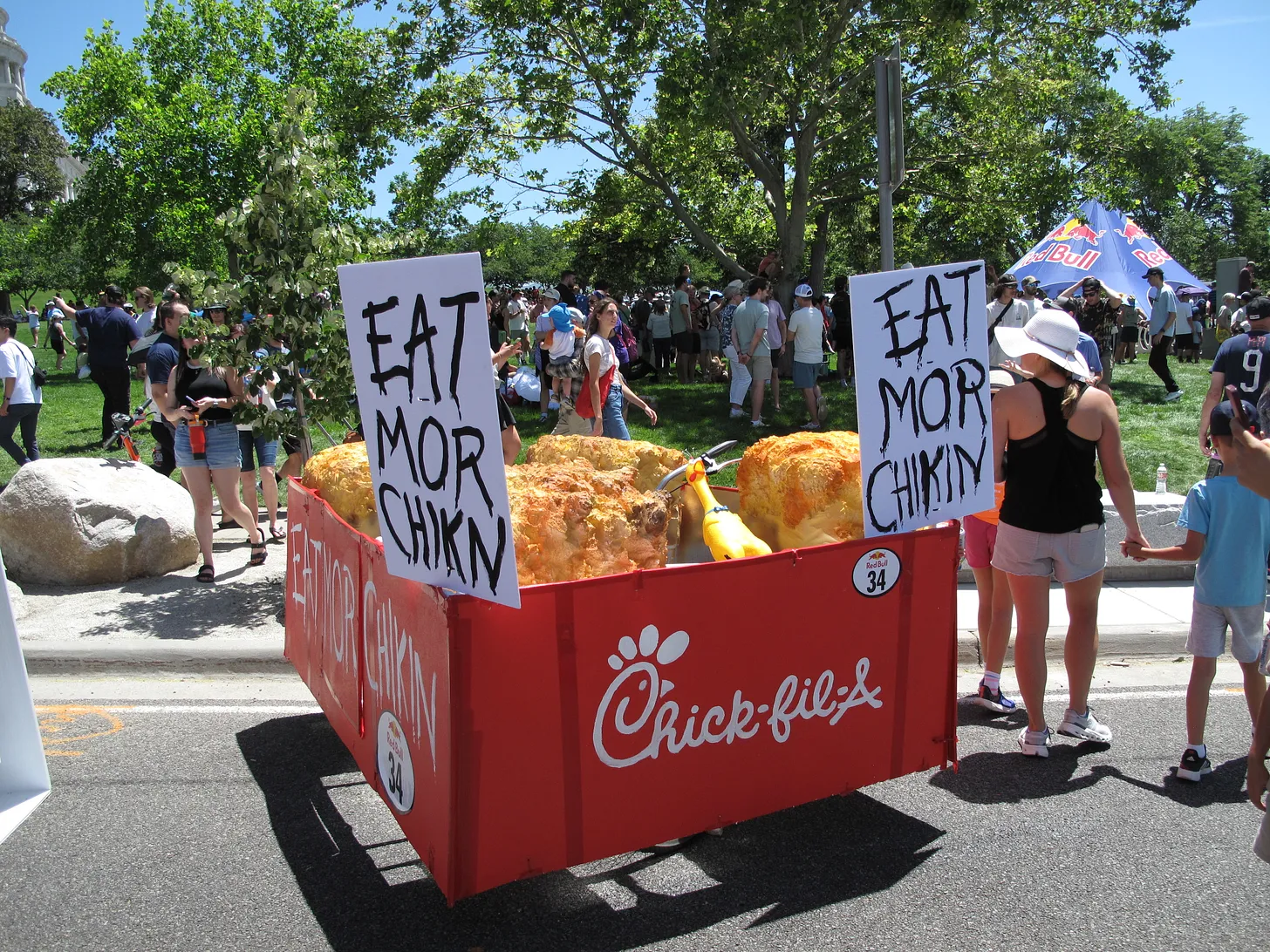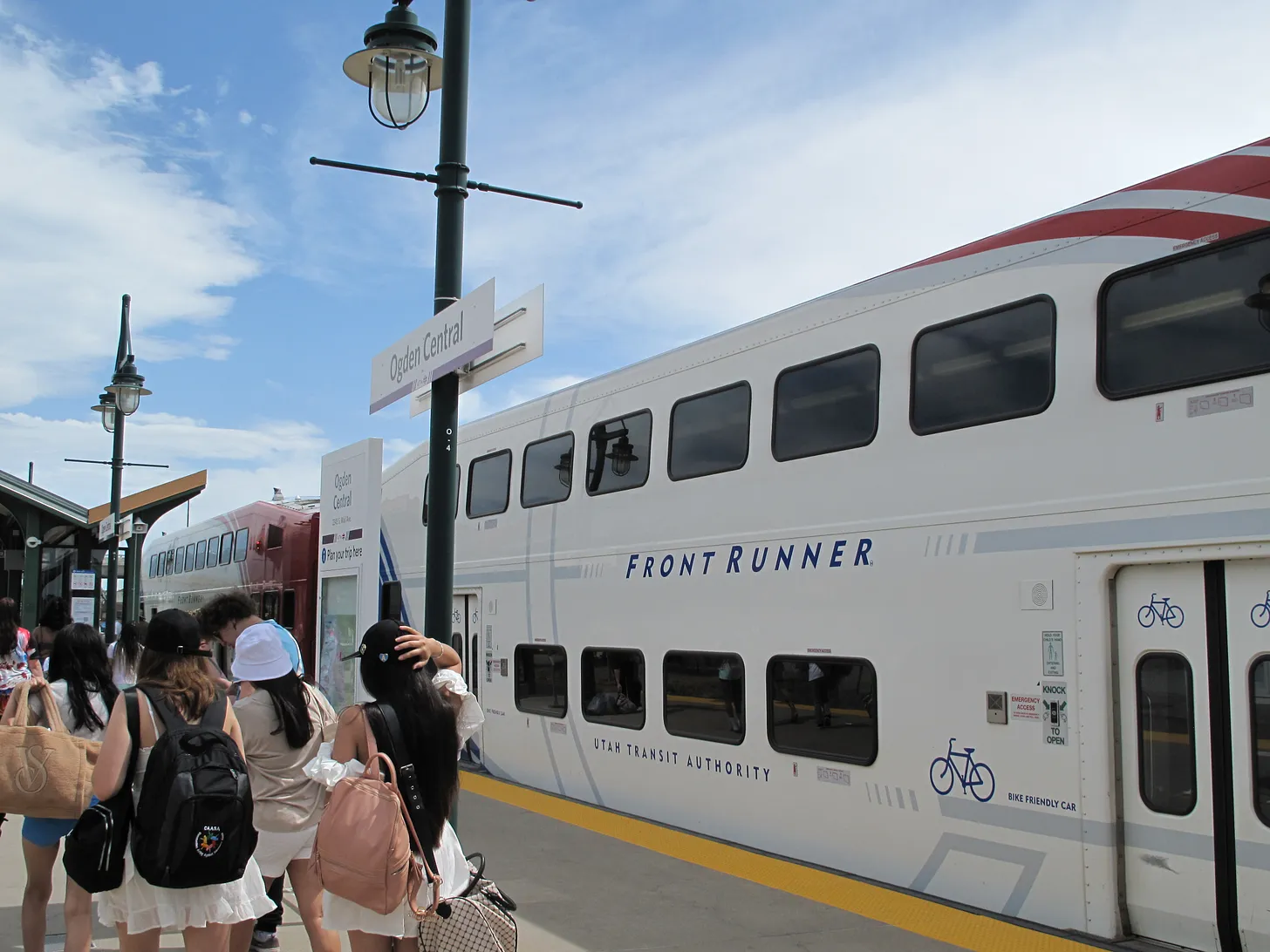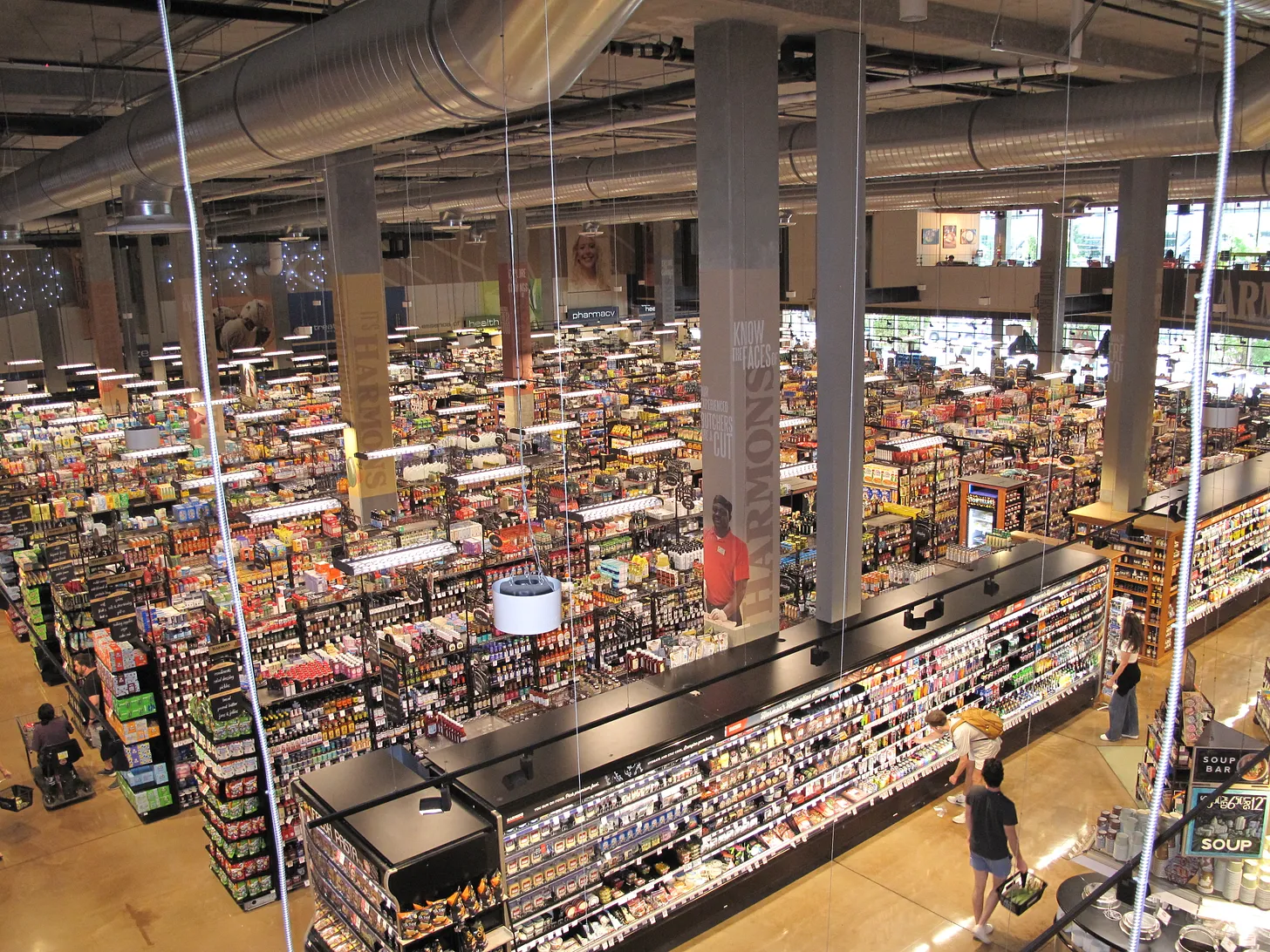utah sprawls like a developer’s fever dream—never-ending farmland that slowly is dissolving into subdivisions while locals have to see their world get bought out around them.

i watched the red bull soapbox derby unfold with 40k (!?!) people in attendance: actual grown adults hurtling down hills in cardboard contraptions for absolutely no reason except the joy of it. apparently this is a thing people have religiously watched since childhood: i only heard about it because a security guard watching us roam the joseph smith memorial at night wanted to share ideas of what to do. honestly the best recap here is that everything in utah felt on theme, as if it was just really well-done worldbuilding, from this race to the hobbyist bull rider we met to the punk rock 80s decor bar selling dirt cheap never-seen-before priced alcohol.

a friend and I decided to go to Utah just to talk to people. completely random people who must have so much lore, we think, and we approach people in the suburbs, taking out the trash, or random store owners. It’s also good for me, because I’m not the best at… approaching random people, minding their own business. I think any life story is interesting, even when it’s just about someone’s daughter slowly moving out of Utah as her parents slowly settle into more and more languid areas.
The first person we properly talk to is a guy who goes by @dollarcompliments, who is out busking poetry on his typewriter. I asked for something for Father’s Day, and he described a snippet of how our relationship has changed over the years, articulating it so beautifully. He then warns us against hitchhiking: I’m not white, and there still are sundown towns in Utah (and gangs, since he teaches at a local prison, and human traffickers). A common theme in literature that always strikes me is small town horror: a feeling when everyone knows each other and anyone slightly different is slowly, insidiously tortured and driven away. Some examples might be that short story in the office of historical corrections, or even the new hit movie Sinners. Maybe the best examples are those of Stephen King. It really scares me more than anything else, and is why I’d rather deal with the danger of a crowded city than the empty parking lots or fields of a sprawling land. A friend describes this as an extant factor of having seen the same few dozen people your entire life: that “slights are remembered; speaking an unkind word can be recalled in two decades.” In we’re gonna know each other forever (the bleachers song), there’s a lyric that pulls as a feeling I’ve never experienced, because I’ve moved around almost every year of my life so far:
Does anyone leave their hometown and actually survive?
I mean does anyone leave their hometown and actually hold the line?
I think this is the thing that makes me most a coast girl, because I felt the kindness of the people in Utah almost cloying, like I couldn’t understand what they were getting at… if they wanted something. But perhaps that is the sort of city pessimism that doesn’t and shouldn’t leak into these smaller communities, where, regardless of their overall beliefs, they are much kinder and patient than those in the city.
A thing I’ve noticed is that Uber drivers are very talkative when the place is boring (San Diego, Utah… lol). The drivers here kept telling the same story: they’d streamed in from LA, fleeing california prices only to discover they were the very mechanism pricing out the people who were here first. one guy worked growth for idaho and vegas, probably making more remote than the locals ever could from their jobs that anchor this place. I could see the math: their California salaries buy Utah dreams while Utah salaries can’t buy Utah anymore. A Mormon couple told us, though, that it’s unfair to blame the Californians: it was bound to happen eventually.

We rode the 750 front-runner and found ourselves surprised by this fast and cheap train system that probably exists bc Mormons actually plan infrastructure!? My fare was just $5.50! I kept thinking about how rare functional public transit is in the American West, at least as far as I know. (Though… the train doesn’t run on Sundays, which is funny.)
I met an elderly couple doing yard work in Ogden who had moved here for the farmland that was now being converted into housing developments. They told me their nearby farmers’ kids don’t want to farm, so the dairy operations that had been around for many decades are being sold to developers who build $600k+ houses where cows used to graze. (We walked into an open house, mentioned later.) She said, “We aren’t very interesting people, just here to live our lives.” She tells us her neighbors are not part of the church, but are their best friends— kind of cool that they can have this acceptance. Both of them had done Spanish-speaking LDS missions—she in LA, he in Arizona. Their house had doubled in value over 20 years without them asking it to. I recognized this as the inverse of the classic American story: accidentally getting rich while your community disappears.
another local says he’d been watching dirt roads turn into suburbs for 39 years. he didn’t like the changes but i wondered what the alternative was—move further out until that gets developed too?
There was an honor-system based honey stand just sitting there—jars of honey, cash box, pure trust. I realized this only works in places where the social fabric hasn’t completely frayed yet: beautiful motorcycles were left outside a bar, people left their garages open… yet, at the same time, everyone we talked to told us the coolest attraction nearby was the… old elementary school building? everyone works so the same employers: the nearby Air Force base, the IRS, and northrup grumman. shoot me if I ever end up living in a place like this, I think.
A calf roper (to be honest, I initially wrote this as “rope cow guy,” but hey, this is literally my first rodeo!) who was watering his yellowed lawn, which he was using for his horses to graze, had moved to Taylor, Utah, 10 years ago. He grew up only an hour’s drive north, and worked half an hour’s drive south, and just wanted to find the right midpoint. As a hobby, he owns a few horses and participates in local competitions, which I find incredibly unique—it’s something I never imagined people would just do on a whim.
we walked into an open house just as they were heading out: richmond homes pushing various first-time buyer programs with artificially low 3% mortgage rates while market rate hits 7%. it’s fascinating (and perhaps close-minded of me) that there are so many families interested in moving out here to the middle of nowhere, where there is no nearest grocery store: you must drive to Ogden.

Then we meet BJ, a once-upon-a-time metal rockstar turned professor of rock, YouTube consumer (ok, actually, he runs a gallery on 25th street), now mentoring young artists while still being too scared to make his own Instagram. He regrets the years he spent listening to what he called “bad advice” and trying to explore music when visual art is really what he loves. he talked about how bands stumble into hits—cherry pie added last minute, american woman by accident, day in the life bc they needed to fill album space. He explained art’s cruel mirror: you achieve 3 out of 5 goals, but only see the 2 failures. Yet, nobody notices your mistakes except you, he said, and so sometimes you must remember the 3 wins. he takes in artists, builds their confidence, helps them sell their art. i asked what was stopping him from posting (“what’s stopping you?” channeling my inner gavin) and he credits the same thing that stops so many artists: the gap between wanting to create and being willing to do the things that aren’t as exciting.
We ended at Kamikaze’s Bar watching Moon Travelers Deluxe, probably the most Utah band name possible. They cover classic heavy rock songs, but the singer says he hates the sound of his own voice, so it’s actually just instrumentals. Interestingly enough, everyone else in the bar seemed to know the band (and each other), just like any other small town.

In the morning, we visit the Mormon Convention Center, and it is beautiful, which shouldn’t be surprising given how much money the LDS church purportedly has (is it true they no longer want to be referred to as Mormons?). The planned renovations of the joseph smith memorial are stunning and kind of reminds me of the interior of the boston symphony concert hall, but a bit more all-american. There are more people of color than I was expecting, and they were so nice, guiding us around and stopping to say hi. Perhaps that South Park episode was right, and Mormonism is really about that kindness and not about the rationality of the religion.


